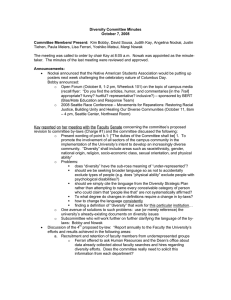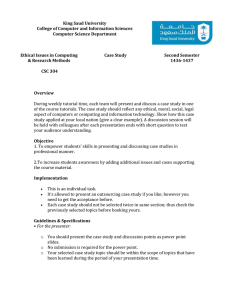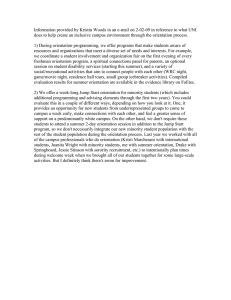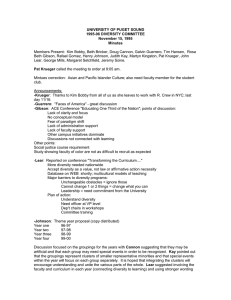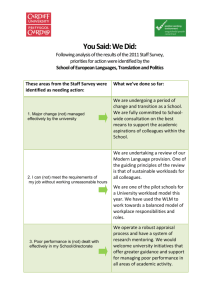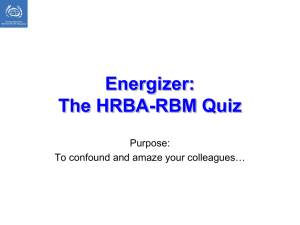Minutes of the September 23, 2008 meeting Faculty Diversity Committee
advertisement
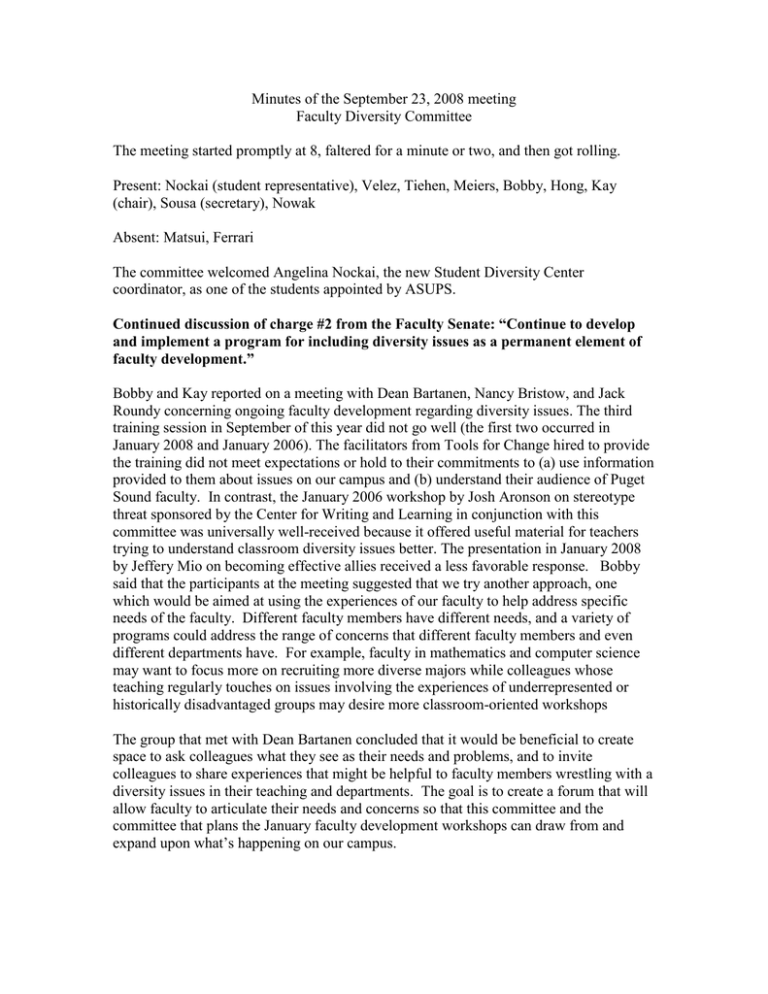
Minutes of the September 23, 2008 meeting Faculty Diversity Committee The meeting started promptly at 8, faltered for a minute or two, and then got rolling. Present: Nockai (student representative), Velez, Tiehen, Meiers, Bobby, Hong, Kay (chair), Sousa (secretary), Nowak Absent: Matsui, Ferrari The committee welcomed Angelina Nockai, the new Student Diversity Center coordinator, as one of the students appointed by ASUPS. Continued discussion of charge #2 from the Faculty Senate: “Continue to develop and implement a program for including diversity issues as a permanent element of faculty development.” Bobby and Kay reported on a meeting with Dean Bartanen, Nancy Bristow, and Jack Roundy concerning ongoing faculty development regarding diversity issues. The third training session in September of this year did not go well (the first two occurred in January 2008 and January 2006). The facilitators from Tools for Change hired to provide the training did not meet expectations or hold to their commitments to (a) use information provided to them about issues on our campus and (b) understand their audience of Puget Sound faculty. In contrast, the January 2006 workshop by Josh Aronson on stereotype threat sponsored by the Center for Writing and Learning in conjunction with this committee was universally well-received because it offered useful material for teachers trying to understand classroom diversity issues better. The presentation in January 2008 by Jeffery Mio on becoming effective allies received a less favorable response. Bobby said that the participants at the meeting suggested that we try another approach, one which would be aimed at using the experiences of our faculty to help address specific needs of the faculty. Different faculty members have different needs, and a variety of programs could address the range of concerns that different faculty members and even different departments have. For example, faculty in mathematics and computer science may want to focus more on recruiting more diverse majors while colleagues whose teaching regularly touches on issues involving the experiences of underrepresented or historically disadvantaged groups may desire more classroom-oriented workshops The group that met with Dean Bartanen concluded that it would be beneficial to create space to ask colleagues what they see as their needs and problems, and to invite colleagues to share experiences that might be helpful to faculty members wrestling with a diversity issues in their teaching and departments. The goal is to create a forum that will allow faculty to articulate their needs and concerns so that this committee and the committee that plans the January faculty development workshops can draw from and expand upon what’s happening on our campus. The Dean offered to support a “modest buffet dinner” to get this effort underway, and the plan is to invite faculty to contribute “narratives” that would be beginning points for discussions of ways of addressing the variety of issues that arise in classrooms and departments across campus. The committee seemed generally supportive of this invitation to have faculty discuss “real classroom experiences” that might help colleagues to improve their teaching, advising, and contacts with students outside the classroom Velez said that he wasn’t sure what sorts of narratives the group would be looking for. Tiehen wondered about the ultimate goal. Kay said that there might be a mix of stories of failures and successes; Bobby suggested that the narratives might provide information to faculty members, tools that they can use in difficult situations when someone has been harmed; Nowak said that the narratives might include discussions of problems encountered and ways that colleagues tried to address those problems. Velez expressed concern that this exercise perpetuates the notion that minority students are always feeling hurt, like victims. There are real problems need to be addressed, but we should avoid tagging students in minority groups as ultra-sensitive and inviting other members of the community to view them that way. Nockai noted that in classes she has observed that sometimes students are tense about saying something that might be offensive, and that some minority students then end wondering why the other students seem to be afraid of them. Velez said that while hostile environments cannot be tolerated, classrooms are uncomfortable places at times. Bobby observed that there are times when colleagues use minority students in their classes as “the texts,” and that this sometimes makes students feel uncomfortable. The committee agreed to continue the discussion of the goals of future faculty development/classroom inclusion efforts on the campus. Housekeeping matters 1. The Committee appointed Tiehen to the Diversity Advisory Council that serves the Chief Diversity Officer. 2. The chair noted continuing efforts to encourage ASUPS to appoint student representatives to the committee. 3. The Committee appointed liaisons to Diversity Center Clubs. APASU (Asian Pacific Student Union): Hong BGLAD (Bisexuals, Gays, Lesbians and Allies for Diversity): Velez JSO (Jewish Student Organization): Kay International Club: Tiehen BSU (Black Student Union): Sousa Vox (Voices of Planned Parenthood): Sousa VAVA (Vagina Anti-Violence Alliance): Kay NASA (Native American Students Association: Nowak The meeting adjourned at 8:56.
